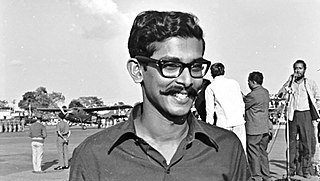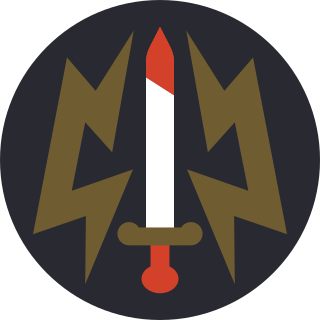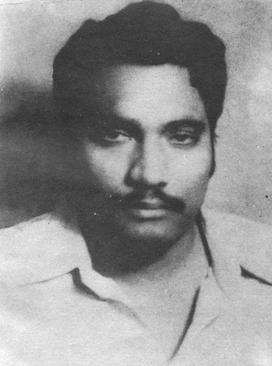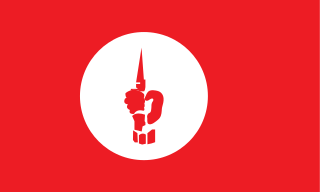Related Research Articles
JRB may refer to:

The first president of Bangladesh, Sheikh Mujibur Rahman, and most of his family were killed during the early hours of 15 August 1975 by a group of young Bangladesh Army personnel who invaded his Dhanmondi 32 residence as part of a coup d'état. Minister of Commerce Khondaker Mostaq Ahmad immediately took control of the government and proclaimed himself president. The assassination marked the first direct military intervention in Bangladesh's civilian administration-centric politics. According to Lawrence Lifscultz, the massacre was a violent outcome of the cold war conflict between the Soviet Union and the United States for establishing their respective dominance in Bangladesh. 15 August is National Mourning Day, an official national holiday in Bangladesh.

Sheikh Kamal was the eldest son of Sheikh Mujibur Rahman, former President of Bangladesh and the younger brother of Sheikh Hasina, the current Prime Minister of Bangladesh.
The Jatiya Rakkhi Bahini was a Bangladeshi para-military force formed in 1972 by the Sheikh Mujibur Rahman government.
Sheikh Fazlul Haque Moni was a Bangladeshi politician. He was one of the nephews of Bangabandhu Sheikh Mujibur Rahman the founding father of Bangladesh. He was the founder of Mujib Bahini Bangladesh Liberation Force-BLF one of the major guerrilla forces of the Bangladesh Liberation War and also the founder of Bangladesh Awami Jubo League, the youth wing of Bangladesh Awami League.
The Mujib Bahini, also known as Bangladesh Liberation Force (BLF), was an armed force formed during the Bangladesh Liberation War to fight against Pakistan in 1971. The force was mainly composed of activists drawn from the Awami League and its student front, the Chhatra League. At its height, it had reportedly 13,000 members. It was organised with the active assistance of Major General Sujan Singh Uban of the Indian Army. Serajul Alam Khan and Sheikh Fazlul Haque Mani, Tofael Ahmed and Abdur Razzaq, MP were the organizers of this force.
Kader Bahini was an independent militia created during the Bangladesh Liberation War of 1971, the other being Mukti Bahini. It was named after its leader, Kader Siddique.
1974 (MCMLXXIV) was a common year starting on Tuesday of the Gregorian calendar, the 1974th year of the Common Era (CE) and Anno Domini (AD) designations, the 974th year of the 2nd millennium, the 74th year of the 20th century, and the 5th year of the 1970s decade.

Savar Cantonment is a cantonment located in Savar, Dhaka, Bangladesh. The 9th infantry division of Bangladesh Army is garrisoned there. Corps of Military Police Centre & School (CMPC&S) and the Savar Golf Club (SGC) are also located in the cantonment.

Siraj Sikder was a Bangladeshi revolutionary politician.

The Mukti Bahini, also known as the Bangladesh Forces, was the guerrilla resistance movement consisting of the Bangladeshi military, paramilitary and civilians during the War of Liberation that transformed East Pakistan into Bangladesh in 1971. They were initially called the Mukti Fauj.
National Defense Force or National Defence Force may refer to:
A.Z.M. Enayetullah Khan was a Bangladeshi journalist and government minister. He founded the weekly newspaper Holiday and the daily newspaper New Age. He served in Ziaur Rahman's Cabinet, first as Minister of Land Administration and Land Reform from December 1977 to June 1978, and then as Minister of Petroleum and Natural Resources from July 1978 to October 1978.
A.N.M NuruzzamanBir Uttom was a Bangladeshi army officer, who was also a sector commander in the Bangladeshi War of Liberation. After the war he served as the first and only director general of the paramilitary force, Jatiya Rakkhi Bahini.
1974 Ramna Massacre was a massacre of Jatiyo Samajtantarik Dal supporters that took place on March 17, 1974. The incident took place when a demonstrators from the Jatiyo Samajtantrik Dal, who were blockading the residence of the Home Minister Mansur Ali, located in the Ramna area of Dhaka, was fired upon by members of Jatiya Rakkhi Bahini. The incident reportedly claimed at least fifty lives.
Committee for Civil Liberties and Legal Aid in short Civil Liberties Committee was a forum in Bangladesh formed by the members of civil society to restore the civil liberties and provide legal aid to the dissenting population of the country who were the victims of Jatiya Rakkhi Bahini. Headed by eminent poet Sikandar Abu Zafar, the committee consisted a total of 33 members.
1972–1975 Bangladesh insurgency refers to the period after the independence of Bangladesh when left-wing Communist insurgents, particularly the Gonobahini fought against the government of the Prime Minister Sheikh Mujibur Rahman.
The 15 August 1975 Bangladesh coup d'état was a military coup launched by mid ranking army officers in Bangladesh on 15 August 1975. The officers were part of a conspiracy to assassinate Sheikh Mujibur Rahman, the Founding Father of Bangladesh, who led the independence struggle during the Bangladesh Liberation War and later served as the first and fourth President and later in between his two presidential terms served as the second Prime Minister of Bangladesh from April 1971 until his assassination in August 1975. Sheikh Mujibur Rahman and most of his family members were killed during the coup, with the exception of his two daughters Sheikh Hasina and Sheikh Rehana.

The premiership of Sheikh Mujibur Rahman began on January 12 of 1972 when he was sworn in as the Prime Minister of Bangladesh after briefly serving as the President after returning from Pakistan's jail on January 10, 1972. He served as the Prime Minister of Bangladesh until January 25, 1975, for three years, and later led the parliament to adopt an amendment of the constitution that made him the President of Bangladesh, effectively for life.
Anwar Ul Alam Shaheed was a Colonel of the Bangladesh Army, secretary in the ministry of foreign affairs, diplomat, and ambassador of Bangladesh to Span and Bahrain. He had served in the Kaderia Bahini and Jatiya Rakkhi Bahini.
References
- Ahsan, Syed Badrul (January 13, 2014). "Myth, reality and Rakkhi Bahini". The Daily Star . Retrieved October 27, 2015.
- Chowdhury, Kamran Reza (August 15, 2013). "New book defends roles of Rakkhi Bahini, Tofail". Dhaka Tribune . Retrieved October 27, 2015.